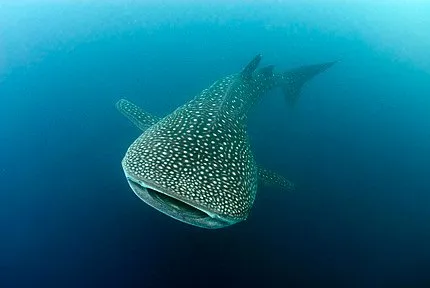
The whale shark (Rhincodon typus) is the largest shark in the world and at the same time bears the title of the world's largest fish.
The largest recorded whale shark was 12.65 meters long and weighed over 21.5 tonnes - and there are also reports of significantly larger whale sharks (which, however, have not been officially confirmed).
Whale sharks typically get around 70 years old.
Food and anatomy
The whale sharks get their name from their size (they are the size of whales) as well as their ability to filter food (which in turn is reminiscent of most whale species' way of capturing food).
Where whales have beards, the whale shark has a similar filtration system: it has a very large mouth (up to 1.5 meters wide!) That is kept open and contains 300-350 rows of small teeth as well as a kind of filter. The teeth do not matter in relation to the whale shark's food. The filter is used to filter all the small animals that come in with the running water. The whale shark's food consists primarily of plankton, but also smaller squid, small fish, fish fry, etc.
Behavior
Whale sharks pose no danger to humans; first and foremost because we are not part of their food spectrum, but also because the whale sharks are quite peaceful by nature. They allow e.g. occasionally divers to cling to them and thereby “get a swim” (although this is not recommended by the experts).
Younger whale sharks are very kind-hearted and may even find themselves playing with divers.